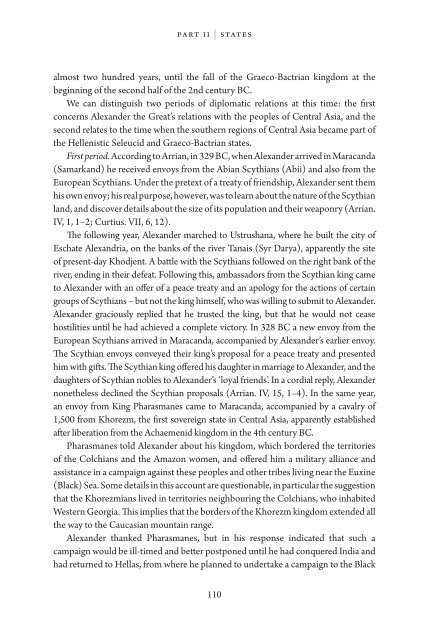Create successful ePaper yourself
Turn your PDF publications into a flip-book with our unique Google optimized e-Paper software.
part ii | states<br />
almost two hundred years, until the fall <strong>of</strong> the Graeco-Bactrian kingdom at the<br />
beginning <strong>of</strong> the second half <strong>of</strong> the 2nd century BC.<br />
We can distinguish two periods <strong>of</strong> diplomatic relations at this time: the first<br />
concerns Alexander the Great’s relations with the peoples <strong>of</strong> Central <strong>Asia</strong>, and the<br />
second relates to the time when the southern regions <strong>of</strong> Central <strong>Asia</strong> became part <strong>of</strong><br />
the Hellenistic Seleucid and Graeco-Bactrian states.<br />
First period. According to Arrian, in 329 BC, when Alexander arrived in Maracanda<br />
(Samarkand) he received envoys from the Abian Scythians (Abii) and also from the<br />
European Scythians. Under the pretext <strong>of</strong> a treaty <strong>of</strong> friendship, Alexander sent them<br />
his own envoy; his real purpose, however, was to learn about the nature <strong>of</strong> the Scythian<br />
land, and discover details about the size <strong>of</strong> its population and their weaponry (Arrian.<br />
IV, 1, 1–2; Curtius. VII, 6, 12).<br />
The following year, Alexander marched to Ustrushana, where he built the city <strong>of</strong><br />
Eschate Alexandria, on the banks <strong>of</strong> the river Tanais (Syr Darya), apparently the site<br />
<strong>of</strong> present-day Khodjent. A battle with the Scythians followed on the right bank <strong>of</strong> the<br />
river, ending in their defeat. Following this, ambassadors from the Scythian king came<br />
to Alexander with an <strong>of</strong>fer <strong>of</strong> a peace treaty and an apology for the actions <strong>of</strong> certain<br />
groups <strong>of</strong> Scythians – but not the king himself, who was willing to submit to Alexander.<br />
Alexander graciously replied that he trusted the king, but that he would not cease<br />
hostilities until he had achieved a complete victory. In 328 BC a new envoy from the<br />
European Scythians arrived in Maracanda, accompanied by Alexander’s earlier envoy.<br />
The Scythian envoys conveyed their king’s proposal for a peace treaty and presented<br />
him with gifts. The Scythian king <strong>of</strong>fered his daughter in marriage to Alexander, and the<br />
daughters <strong>of</strong> Scythian nobles to Alexander’s ‘loyal friends’. In a cordial reply, Alexander<br />
nonetheless declined the Scythian proposals (Arrian. IV, 15, 1–4). In the same year,<br />
an envoy from King Pharasmanes came to Maracanda, accompanied by a cavalry <strong>of</strong><br />
1,500 from Khorezm, the first sovereign state in Central <strong>Asia</strong>, apparently established<br />
after liberation from the Achaemenid kingdom in the 4th century BC.<br />
Pharasmanes told Alexander about his kingdom, which bordered the territories<br />
<strong>of</strong> the Colchians and the Amazon women, and <strong>of</strong>fered him a military alliance and<br />
assistance in a campaign against these peoples and other tribes living near the Euxine<br />
(Black) Sea. Some details in this account are questionable, in particular the suggestion<br />
that the Khorezmians lived in territories neighbouring the Colchians, who inhabited<br />
Western Georgia. This implies that the borders <strong>of</strong> the Khorezm kingdom extended all<br />
the way to the Caucasian mountain range.<br />
Alexander thanked Pharasmanes, but in his response indicated that such a<br />
campaign would be ill-timed and better postponed until he had conquered India and<br />
had returned to Hellas, from where he planned to undertake a campaign to the Black<br />
110


